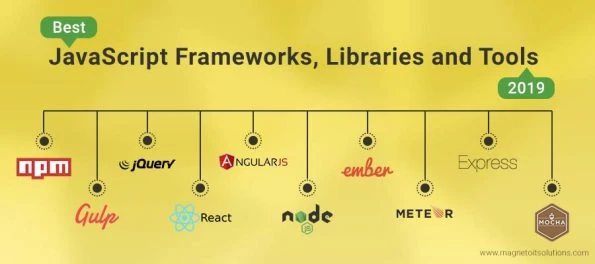News Blast
Your daily source for breaking news and insightful articles.
JavaScript Frameworks: Choosing Your Sidekick in Web Development
Discover the ultimate guide to JavaScript frameworks! Unleash your web development potential and choose your perfect coding sidekick today!
Exploring Popular JavaScript Frameworks: Which One Fits Your Project?
JavaScript frameworks have revolutionized the way developers build and maintain web applications. Among the most popular frameworks are React, Vue.js, and Angular. Each framework boasts unique features and benefits, making it crucial to understand which one aligns best with your project requirements. For instance, React offers a component-based architecture that promotes reusability and efficiency, while Vue.js is favored for its gentle learning curve and flexibility. Meanwhile, Angular provides a comprehensive solution with strong support for enterprise-level applications.
When deciding which framework to choose, consider the following factors:
- Project Scope - Is your project small and simple, or large and complex?
- Team Expertise - What is the proficiency level of your development team with each framework?
- Community Support - Does the framework have a vibrant community and extensive resources?

The Key Differences Between React, Angular, and Vue: A Comprehensive Guide
When it comes to front-end development, choosing the right JavaScript framework is crucial for building efficient and scalable applications. React, Angular, and Vue are three of the most popular frameworks, each with its unique features and advantages. React is known for its component-based architecture and virtual DOM, which enhances performance by minimizing direct manipulation of the DOM. On the other hand, Angular offers a robust framework with two-way data binding and dependency injection, making it suitable for larger applications. Lastly, Vue strikes a balance between the two, providing a progressive framework that is easy to integrate with existing projects.
One of the key differences between these frameworks lies in their learning curves and community support. React has a large and active community, which means extensive resources and libraries are available, making it easier for new developers to find support. Angular, being a full-fledged MVC framework, can feel daunting to beginners due to its complexity. However, it provides a comprehensive solution for building enterprise-level applications. Conversely, Vue is praised for its approachable nature, which allows developers to gradually adopt its features. Ultimately, the choice between React, Angular, and Vue should be guided by project requirements, team proficiency, and long-term maintenance considerations.
How to Choose the Right JavaScript Framework for Your Web Development Needs?
Choosing the right JavaScript framework for your web development needs is crucial for the success of your project. With a variety of options available, you should start by evaluating the specific requirements of your application. Consider factors such as the complexity of the project, the user experience you want to achieve, and the learning curve for your development team. Popular frameworks like React, Angular, and Vue.js each have their own strengths and ideal use cases. For instance, React is highly praised for its component-based architecture, while Angular is suited for large-scale applications due to its robust features.
Once you have a clear understanding of your project's needs, you should also assess the community support and ecosystem of the frameworks you're considering. A strong community can provide valuable resources, plugins, and solutions to common problems. Additionally, it's essential to think about the long-term viability of the framework. Frameworks that are regularly updated and maintained are more likely to remain relevant and secure in the future. In summary, choosing the right JavaScript framework involves balancing your project requirements with community support and longevity, ensuring a solid foundation for your web development endeavors.